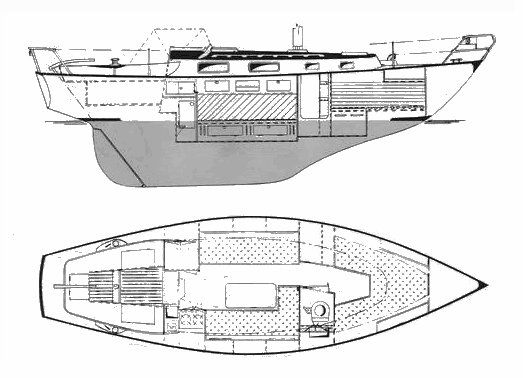The Vindö 32, first launched in 1976, embodies the Swedish boatbuilding tradition of robust construction, elegant lines, and a warm, inviting interior. Designed by the esteemed Carl Andersson, a key figure in the Vindö lineage, this masthead sloop was crafted by Nötesunds Varv AB, the shipyard renowned for its iconic Vindö range. With a length overall of just under 30 feet and a waterline length of over 22 feet, the Vindö 32 was conceived as a capable and comfortable cruising yacht, appealing to sailors seeking a vessel with classic charm and reliable performance.
Vindo 32 Information, Review, Specs

- Make
- Vindo
- Model
- 32
- Number Built
- Production Year(s)
- 1976 - ??
History and Design
The Vindö 32 emerged during a significant period for Nötesunds Varv AB, as the shipyard had largely transitioned to Glass Reinforced Plastic (GRP) hull construction by the mid-1960s, while still retaining its signature wooden superstructures. Carl Andersson, the primary naval architect for many early Vindö designs, instilled his philosophy of meticulous workmanship and thoughtful layouts into the Vindö 32, 1, 2, 3]. The builder's ethos emphasized quality, style, and comfort, aiming to provide a superb ownership experience. The Vindo 32 features a solid fiberglass hull and a solid fiberglass deck, complemented by a distinctive coachroof often crafted with mahogany or teak joinery, a hallmark of the brand's aesthetic, 3, 6, Builder Article]. There is no widely documented evidence of significant variations like MkI or MkII models during its production run.
Sailing Performance and Handling
The Vindö 32 is characterized by a long keel, contributing to its reputation for directional stability and a comfortable motion in a seaway. Its sail area to displacement ratio of approximately 14.2 suggests that while not a dedicated light-air racer, she offers moderate performance suitable for cruising. With a ballast to displacement ratio of about 0.405, the Vindö 32 demonstrates a good degree of stiffness and stability, allowing her to stand up well to a breeze. Furthermore, a displacement-to-length ratio of around 334 indicates a heavy displacement vessel for its size, which translates to a solid and reassuring feel on the water. Owners and reviewers frequently describe the boat as stable and well-behaved, possessing excellent sailing characteristics. The design hull speed for the Vindö 32 is calculated at 6.38 knots.
Accommodations and Layout
The interior of the Vindö 32 is a highlight, consistently praised for its cozy atmosphere and the extensive use of solid mahogany joinery throughout. The traditional layout typically includes a V-berth forward, followed by a head compartment. The main saloon features an L-shaped settee, providing comfortable seating and dining space. Despite its overall length, the Vindo 32 offers generous headroom, typically around 1.84 meters (approximately 6 feet) to 1.90 meters (approximately 6.2 feet) in the saloon, which is a considerable asset for a boat of this size. The galley is typically located within the main cabin. While specific details on storage and ventilation rely on individual boat configurations, the overall impression from owners points to a well-finished and classic interior. The boat also carries a water capacity of 30 gallons.
Owner's Perspectives
Owners of the Vindö 32 often laud its robust construction and classic, appealing lines, highlighting its enduring charm. The boat's solid and stable nature under sail is a frequently cited strength, providing confidence in various sea states. Many appreciate the comfortable and cozy interior, a testament to the quality of the mahogany craftsmanship. However, some common concerns have been noted over time. The original teak decks, if present, can be a source of maintenance and potential problems requiring careful consideration. Additionally, issues related to the hull-to-deck seam were not uncommon for boats of this era and may require attention. Instances of wood rot, particularly concerning the wooden components like the coachroof or other deck structures, have been reported in older models, underscoring the importance of diligent maintenance to preserve the boat's integrity.
Measurements
Construction & Hull
- Construction Material
- Fiberglass (Solid)
- Hull Type
- Monohull Sailboat
- Keel Type
- Long
- Rudder
- 1x —
- Ballast
- 3525 lbs
- Displacement
- 8700 lbs
- Water Capacity
- 30 gal
- Fuel Capacity
- 15 gal
Engine
- Engine Make
- Volvo Penta
- Engine Model
- MD6A
- Engine Type
- —
- Engine HP
- 10
- Engine Count
- 1
- Drive Type
- —
- Fuel Type
- Diesel
Rig & Sails
- Rig Type
- Masthead Sloop
- P (Main Luff)
- 32.15 ft
- E (Main Foot)
- 10.5 ft
- I (Foretriangle Height)
- 37 ft
- J (Foretriangle Base)
- 11.38 ft
- Forestay Length (est)
- 38.71 ft
- Main Sail Area
- 168.79 sqft
- Foretriangle Sail Area
- 210.53 sqft
- Total Sail Area (Reported)
- 379 sqft
- Total Sail Area (Calc)
- 379.32 sqft
Dimensions
- LOA
- 29.36 ft
- LWL
- 22.64 ft
- Beam
- 9 ft
- Draft
- 4.6 ft
- Max Headroom
- -
- Air Draft
- -
Calculations
- Hull Speed
- 6.38 kn
- Pounds per Inch Immersion
- 728.06